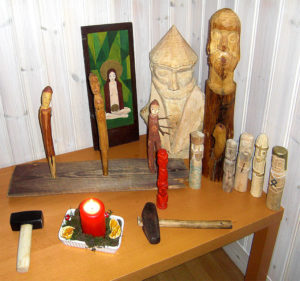When the Other Gods Call to You
 You’ve been in a religion for some time. Or perhaps you’ve not been in a religion at all. Maybe it is Christianity; maybe it is another pagan religion. Perhaps you’ve been agnostic or even atheist. Or maybe you’re a Heathen like I am. Regardless, now you’re looking at a calling and…it’s not a god or goddess you follow. What do you do?
You’ve been in a religion for some time. Or perhaps you’ve not been in a religion at all. Maybe it is Christianity; maybe it is another pagan religion. Perhaps you’ve been agnostic or even atheist. Or maybe you’re a Heathen like I am. Regardless, now you’re looking at a calling and…it’s not a god or goddess you follow. What do you do?
Getting Beyond the Shock
 If you’re a Christian or someone who have been in the Abrahamic religions, this is often a complete shock. Same goes for atheists, who are more likely to think they’ve gone crazy hearing from a god or goddess. Depending on your religious upbringing, you may think the deity is some form of demon coming to tempt you away from the “One True God.” If you fall for the Yahweh argument, you’ll never get anywhere with this. Instead, you’ll turn down a potential positive and more personal relationship with the gods than you ever had with the god of the monotheistic cults.
If you’re a Christian or someone who have been in the Abrahamic religions, this is often a complete shock. Same goes for atheists, who are more likely to think they’ve gone crazy hearing from a god or goddess. Depending on your religious upbringing, you may think the deity is some form of demon coming to tempt you away from the “One True God.” If you fall for the Yahweh argument, you’ll never get anywhere with this. Instead, you’ll turn down a potential positive and more personal relationship with the gods than you ever had with the god of the monotheistic cults.
If you’re a pagan, chances are you’re probably open to it. But there are pantheons and there are pantheons. For example, if you’re Heathen like I am, and you’re called by someone like the Morrigan, you’ll be arguing with yourself over whether you’ve just become “Wiccatru” and not on the straight and narrow path of Asatru. Well, maybe, maybe not.
Who is Doing the Calling?
The first step is to understand who is contacting you. Most of the time, as I understand it, the calls are pretty subtle. Mine was sudden and intense. If it’s a Heathen calling, it could be a god or goddess, it could be an ancestor of yours, or it could be a spirit of the land. If you think it’s another god or spirit from a different pantheon, it could be one of the many manifestations of a Heathen god or spirit. You see, many of the pagan religions came from a singular Indo-European source and the Heathen gods are often their gods, but just different names and manifestations.
Some gods and goddesses are specific to a religion, in which case, I recommend talking to someone more knowledgeable in that religion to understand what is happening. It might be their deity or it might be something else. Without having a clear knowledge of who is calling, you just might not be speaking with the deity you think you’re speaking with.
Do You Really Want to Deal with this God or Goddess?
Once you establish who you’re dealing with, it’s up to you to decide if the god or goddess is someone you want to talk to. Some deities have some pretty nasty reputations and they can be nothing but trouble, even if they’re from the Norse pantheon. Then again, depending on the god, you may or may not have a good relationship with them.
If it becomes obvious that the god you’re speaking with isn’t the god you think it is, it’s up to you to decide if you really want to deal with them. Some gods and goddesses aren’t trustworthy, and just because you’ve heard of them doesn’t mean they’re the right deity for you. Pagan deities are like people–they have their positives and negatives. Even my own god, Tyr, has pitfalls, although I tend to downplay those negatives because of all the positives.
My point is that as someone who is being called, it’s up to you to decide whether you should answer it.
When Not to Work with a God or Goddess
 You’ve gotten a call from a deity. Before you get all starry-eyed, think about what you’re committing yourself to. Is this god or goddess asking you to do something against your morals or against the law? Are they looking at having you harm someone or yourself? If the answer is yes, then say no and walk away. Take the high road here. Don’t be like Abraham who was asked to sacrifice his only son as a burnt offering because apparently Yahweh gets his rocks off watching humans squirm, even though he is supposedly omniscient and omnipotent. What was the purpose of THAT mindfuck? Tell me that. Don’t say to prove loyalty, because an omniscient and omnipotent god would already know the outcome.
You’ve gotten a call from a deity. Before you get all starry-eyed, think about what you’re committing yourself to. Is this god or goddess asking you to do something against your morals or against the law? Are they looking at having you harm someone or yourself? If the answer is yes, then say no and walk away. Take the high road here. Don’t be like Abraham who was asked to sacrifice his only son as a burnt offering because apparently Yahweh gets his rocks off watching humans squirm, even though he is supposedly omniscient and omnipotent. What was the purpose of THAT mindfuck? Tell me that. Don’t say to prove loyalty, because an omniscient and omnipotent god would already know the outcome.
Look, sometimes what a god wants and what you want isn’t in your best interest. Don’t fall for the “god’s greater plan” bullshit. If it’s a good plan, then there should be a quid pro quo. Yeah, it’s a god, and you can still say no. Can they fuck up your life for saying no? Sure. But then, they’ve shown you their true colors anyway. Do you really want to work with a vindictive and dangerous god who is likely to harm you more than help you?
The Upshot of Dealing with Deities
Dealing with gods aren’t always sunshine and light. If you get a call from a god or goddess, study  the Hel out of them and get a good feeling for who they are. Talk to priests or priestesses of that religion and get their take on your contact. Be aware that you may not have been contacted by a god, but by an ancestor, a wight, or some other denizen looking to make contact. When you do finally establish contact, find out what they want. If what they want isn’t against your moral code or the law, then you have to decide if you want them in your life. (If it is against your moral code or the law, run like Hel.) Above all, keep your head when this all occurs. You may have to step gracefully out of the relationship. Lastly, even if the god or goddess isn’t from your pantheon, you should still accept the contact if it is a favorable one. After all, the deity thought enough about you to visit.
the Hel out of them and get a good feeling for who they are. Talk to priests or priestesses of that religion and get their take on your contact. Be aware that you may not have been contacted by a god, but by an ancestor, a wight, or some other denizen looking to make contact. When you do finally establish contact, find out what they want. If what they want isn’t against your moral code or the law, then you have to decide if you want them in your life. (If it is against your moral code or the law, run like Hel.) Above all, keep your head when this all occurs. You may have to step gracefully out of the relationship. Lastly, even if the god or goddess isn’t from your pantheon, you should still accept the contact if it is a favorable one. After all, the deity thought enough about you to visit.




 Being mindful and paying attention to the land opens a whole new world of experiences you never knew existed. You start noticing not only the cooler temperatures of autumn setting in, but also the increase or decrease in humidity that follows the change. Maybe you start seeing stratus clouds and high cirrus replace the fluffy cumulus. Maybe you see a shift in the bird population, the increase or decrease of certain insects, or even the shift in the quality of light you get. Instead of noticing the latest fall fashions creeping into people’s wardrobes, you notice how the squirrels are moving from tree to tree to gather food. You may see different species of birds. If you live in a place with deer, you may see a shift in their foraging.
Being mindful and paying attention to the land opens a whole new world of experiences you never knew existed. You start noticing not only the cooler temperatures of autumn setting in, but also the increase or decrease in humidity that follows the change. Maybe you start seeing stratus clouds and high cirrus replace the fluffy cumulus. Maybe you see a shift in the bird population, the increase or decrease of certain insects, or even the shift in the quality of light you get. Instead of noticing the latest fall fashions creeping into people’s wardrobes, you notice how the squirrels are moving from tree to tree to gather food. You may see different species of birds. If you live in a place with deer, you may see a shift in their foraging. At this point, you may be wondering how this makes you a better Heathen. Let’s think about this a bit: our gods and the landvaettir are nature entities. Even Odin, who is our creator god, deals with natural forces. (How much more natural is the creation of life?) So, we’re looking at gods who reside over nature. By paying attention to things not human made, we gain a deeper understanding in the world around us. You become a better Heathen, and you even open yourself up to the wights and gods. It may or may not be a type of magic, but I know it works.
At this point, you may be wondering how this makes you a better Heathen. Let’s think about this a bit: our gods and the landvaettir are nature entities. Even Odin, who is our creator god, deals with natural forces. (How much more natural is the creation of life?) So, we’re looking at gods who reside over nature. By paying attention to things not human made, we gain a deeper understanding in the world around us. You become a better Heathen, and you even open yourself up to the wights and gods. It may or may not be a type of magic, but I know it works. gods without all the mumbo-jumbo. In fact, I suspect it’s the best way to get in touch with the gods. You don’t get a conversation with the gods from mumbling prayers or sacrificing goats usually. You get that from opening yourself to them and seeing who pops up. That requires paying attention to them and listening to what they have to say.
gods without all the mumbo-jumbo. In fact, I suspect it’s the best way to get in touch with the gods. You don’t get a conversation with the gods from mumbling prayers or sacrificing goats usually. You get that from opening yourself to them and seeing who pops up. That requires paying attention to them and listening to what they have to say.
 supernatural beings. The concept of the angel, that is a messenger of the gods, goes back a fairly long ways in history. The concept isn’t linked just to the Abrahamic beliefs. The word, “angel,” comes from the Greek word,
supernatural beings. The concept of the angel, that is a messenger of the gods, goes back a fairly long ways in history. The concept isn’t linked just to the Abrahamic beliefs. The word, “angel,” comes from the Greek word, ![Carol M. Highsmith [Public domain], via Wikimedia Commons](https://www.rationalheathen.com/wp-content/uploads/2018/08/Snake-oil_salesman_Professor_Thaddeus_Schmidlap_at_Enchanted_Springs_Ranch_Boerne_Texas_USA_28650a-200x300.jpg) The concept of communing with angels and archangels doesn’t seem that farfetched to me, as I’ve noted. But the concept of charging people a monthly fee for their insight sends off warning bells as being a charlatan. They claim that people won’t believe their message if they don’t charge something, but getting rich off advice given by the minions of a poor Jewish carpenter seems a bit hypocritical. Okay, a lot hypocritical.
The concept of communing with angels and archangels doesn’t seem that farfetched to me, as I’ve noted. But the concept of charging people a monthly fee for their insight sends off warning bells as being a charlatan. They claim that people won’t believe their message if they don’t charge something, but getting rich off advice given by the minions of a poor Jewish carpenter seems a bit hypocritical. Okay, a lot hypocritical. Yes, the runes are the runes. They may or may not tap into a god’s psyche. And one could claim, I suppose, that you spent umpty umpty bucks becoming a channeler. You know how much training I had with the runes? Zilch, other than books. You know how much training I had contacting gods? Yep, zilch, nada, none. And yet, I’ve gotten some interesting contacts.
Yes, the runes are the runes. They may or may not tap into a god’s psyche. And one could claim, I suppose, that you spent umpty umpty bucks becoming a channeler. You know how much training I had with the runes? Zilch, other than books. You know how much training I had contacting gods? Yep, zilch, nada, none. And yet, I’ve gotten some interesting contacts. For one thing, I don’t believe in the Christian god, and if he does exist, he’s not the god the Christians think he is. So, the angels and archangels could be damn near anyone or anything. Hels bells, it might even be a malevolent spirit. If I hazard a guess, I think they’re probably talking to a wight, if they’re talking to anything.
For one thing, I don’t believe in the Christian god, and if he does exist, he’s not the god the Christians think he is. So, the angels and archangels could be damn near anyone or anything. Hels bells, it might even be a malevolent spirit. If I hazard a guess, I think they’re probably talking to a wight, if they’re talking to anything. For those getting into Heathenism, and for those who have been in Heathenism some time, it’s important to recognize when someone is blowing smoke up your ass. (As an aside, this term actually comes from an attempted “cure” by blowing smoke up someone’s ass. I know, TMI.) Basically if someone is demanding lots of money for something that isn’t particularly well defined, such as prognostication, you may want to ask a lot of questions. Questions include:
For those getting into Heathenism, and for those who have been in Heathenism some time, it’s important to recognize when someone is blowing smoke up your ass. (As an aside, this term actually comes from an attempted “cure” by blowing smoke up someone’s ass. I know, TMI.) Basically if someone is demanding lots of money for something that isn’t particularly well defined, such as prognostication, you may want to ask a lot of questions. Questions include:

 see what was supposedly “deleted.”) Now, before we get into the discussion whether or not I agree with the piece, let me state emphatically that I think it’s wrong on a multitude of levels. That being said, I also think that Forbes should not have pulled the article in response to the shitstorm that ensued over it. Yeah, it is a form of censorship.
see what was supposedly “deleted.”) Now, before we get into the discussion whether or not I agree with the piece, let me state emphatically that I think it’s wrong on a multitude of levels. That being said, I also think that Forbes should not have pulled the article in response to the shitstorm that ensued over it. Yeah, it is a form of censorship. Yeah, I just used the “C” word: censor. Granted, it’s not the government cracking down on free speech, but it might as well could be. You see, just because an idea is unpopular doesn’t mean it should never be talked about. I mean, if this guy wants to talk about shutting down libraries in lieu of coffee shops and Amazon bookstores, who the fuck am I to prevent him from talking about it? It’s his idea and if Forbes thought it was good enough to print, they should just stick with it and take their lumps. They’re not inciting violence, nor are they talking about doing something illegal. The author just put his unpopular opinion out there.
Yeah, I just used the “C” word: censor. Granted, it’s not the government cracking down on free speech, but it might as well could be. You see, just because an idea is unpopular doesn’t mean it should never be talked about. I mean, if this guy wants to talk about shutting down libraries in lieu of coffee shops and Amazon bookstores, who the fuck am I to prevent him from talking about it? It’s his idea and if Forbes thought it was good enough to print, they should just stick with it and take their lumps. They’re not inciting violence, nor are they talking about doing something illegal. The author just put his unpopular opinion out there. At this point, you’re probably wondering what I think about other more controversial views, such as racism, Nazism, slavery, or child pornography. Obviously, I’m against those things that exploit innocents, and I am sure as shit against things like slavery, racism, Nazis, and child pornography. That being said, there is a lot of gray when it comes to freedom of speech. Writing a racist blog is one thing; inciting people to riot or to kill other ethnicities because you don’t like the look of that person is another.
At this point, you’re probably wondering what I think about other more controversial views, such as racism, Nazism, slavery, or child pornography. Obviously, I’m against those things that exploit innocents, and I am sure as shit against things like slavery, racism, Nazis, and child pornography. That being said, there is a lot of gray when it comes to freedom of speech. Writing a racist blog is one thing; inciting people to riot or to kill other ethnicities because you don’t like the look of that person is another. own group is in charge as if it will never affect them. In America, at least, nobody’s party is in charge forever. When you deny freedoms for the other groups, you’re denying yourself freedom when the other groups get in charge (which inevitably happens). It’s like you think the good times are going to keep on rolling forever, and you can’t see beyond the next week, let alone four years from now. One thing is for certain: you give up a right, even if you aren’t using it now, and you will regret it.
own group is in charge as if it will never affect them. In America, at least, nobody’s party is in charge forever. When you deny freedoms for the other groups, you’re denying yourself freedom when the other groups get in charge (which inevitably happens). It’s like you think the good times are going to keep on rolling forever, and you can’t see beyond the next week, let alone four years from now. One thing is for certain: you give up a right, even if you aren’t using it now, and you will regret it.


 You’re Not a Racist, Unless You Hate Vulcans
You’re Not a Racist, Unless You Hate Vulcans



 It’s Hel getting old. As one who is now considered “middle aged” (assuming I live to 100), the quest for Idunn’s apples in the form of immortality, or at least eternal youth, interests me. It probably interests you too, even if you’re young and have many years ahead of you. After all, we can’t enjoy life if we’re dead. Funny, scientists have that very same opinion. I just wish they’d work harder at it, seeing as we’re not getting any younger.
It’s Hel getting old. As one who is now considered “middle aged” (assuming I live to 100), the quest for Idunn’s apples in the form of immortality, or at least eternal youth, interests me. It probably interests you too, even if you’re young and have many years ahead of you. After all, we can’t enjoy life if we’re dead. Funny, scientists have that very same opinion. I just wish they’d work harder at it, seeing as we’re not getting any younger. That Which Does Not Kill Us…
That Which Does Not Kill Us… eres are the little end caps on our chromosomes. The longer the telomeres, the younger our cells remain. The shorter the telomeres, the more aged our bodies become. People can lengthen their telomeres through diet, exercise, and other healthy habits and can shorten them by doing unhealthy things like smoking. Some pills are purported to increase the telomere’s length by increasing telomerase (an enzyme), but there may be some serious side effects. Basically, telomerase may be Idunn’s apples, but like Idunn’s apples, we don’t know if she needs to pick them and hand them to everyone to get the full effect.
eres are the little end caps on our chromosomes. The longer the telomeres, the younger our cells remain. The shorter the telomeres, the more aged our bodies become. People can lengthen their telomeres through diet, exercise, and other healthy habits and can shorten them by doing unhealthy things like smoking. Some pills are purported to increase the telomere’s length by increasing telomerase (an enzyme), but there may be some serious side effects. Basically, telomerase may be Idunn’s apples, but like Idunn’s apples, we don’t know if she needs to pick them and hand them to everyone to get the full effect. Everything ages in our world. Our gods would age too, if it weren’t for Idunn (Iðunn) and her apples. Loki the master trickster was tricked by the Jotunn, Thjazi (Þjazi), to steal Idunn and her apples for him. Loki obliges, but also rescues Idunn from Thjazi.
Everything ages in our world. Our gods would age too, if it weren’t for Idunn (Iðunn) and her apples. Loki the master trickster was tricked by the Jotunn, Thjazi (Þjazi), to steal Idunn and her apples for him. Loki obliges, but also rescues Idunn from Thjazi. So, is this a story about the stealing of fertility and the recovery of it? Or is this the story of the loss of youth and the recovery of it? Maybe it’s both.
So, is this a story about the stealing of fertility and the recovery of it? Or is this the story of the loss of youth and the recovery of it? Maybe it’s both.

 It’s been about six years since Tyr and Thor first entered my life as Norse gods and I’ve entered Heathenry. (Tyr has been in my life for years, only I didn’t recognize him.) I’ve been thankful they’ve done so because they’ve offered a a new perspective on my life that I had not gotten any other way. I still deal with a number of really stupid issues due to Christianity that I brought with me, but I can feel a certain amount of healing going on that I just didn’t have with the other religions, and lack of religion.
It’s been about six years since Tyr and Thor first entered my life as Norse gods and I’ve entered Heathenry. (Tyr has been in my life for years, only I didn’t recognize him.) I’ve been thankful they’ve done so because they’ve offered a a new perspective on my life that I had not gotten any other way. I still deal with a number of really stupid issues due to Christianity that I brought with me, but I can feel a certain amount of healing going on that I just didn’t have with the other religions, and lack of religion.
 Even if we somehow magically figured out everything about Heathenry in the ancient times, would we really want to mimic it? If you say “yes” then apparently you want to bring back human sacrifice, and
Even if we somehow magically figured out everything about Heathenry in the ancient times, would we really want to mimic it? If you say “yes” then apparently you want to bring back human sacrifice, and